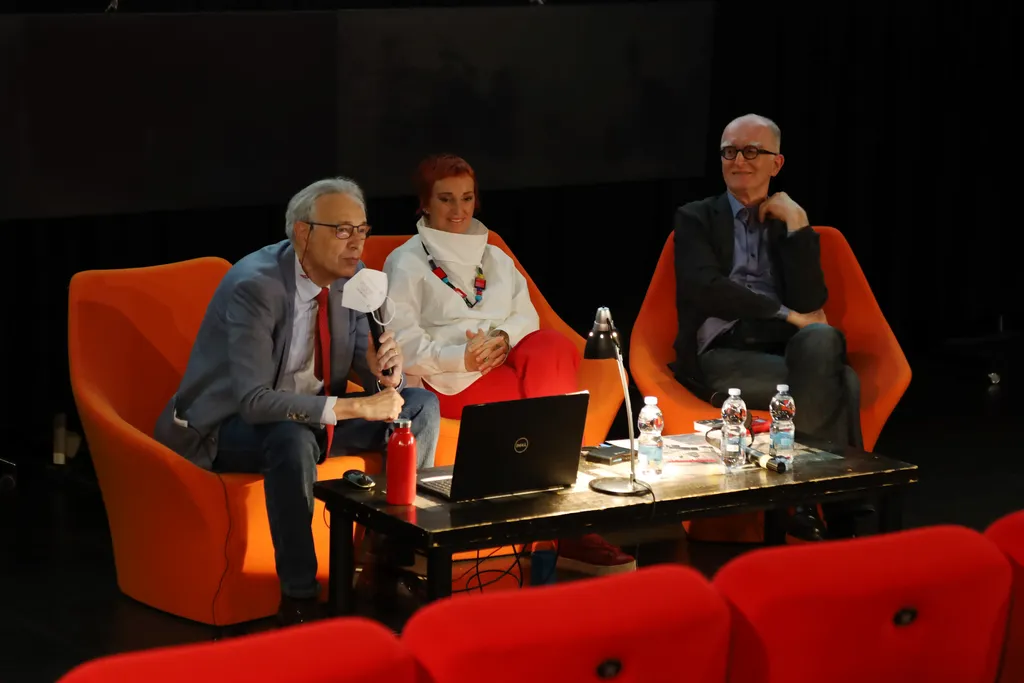Raoul Pupo, Katja Hrobat Virloget: War and Peace, Consequences for the Population
During the symposium East - West Border through film and history in 2022, the historian Raoul Pupo and the anthropologist Katja Hrobat Virloget gave interesting lectures, in which they presented their own professional points of view about the problem of the post-war resettlement of peoples in the area of Istria, the specific political situation, and the propaganda motives of the parties involved, which were also reflected in the contemporary film production, both in documentaries and in feature films.
Raoul Pupo is a historian from Trieste and an associate professor at the Department of Political and Social Sciences at the University of Trieste, who also became a member of the mixed Italian-Croatian and Italian-Slovenian historical-cultural commission in 1996. He devoted many publications to the subject of the Istrian exodus and the reconstruction of the historical and political events in the Free Trieste Territory, paying special attention to the analysis of the population involved in this situation.
Katja Hrobat Virloget is an archaeologist, ethnologist and cultural anthropologist who works as an associate professor and research associate at the Faculty of Humanities at the University of Koper. As an expert, she has been researching the so-called exodus and the resulting immigration to Istria ever since her postdoctoral project in 2012. In 2021, she summarized her research work in the book In the Silence of Memory - "Exodus" and Istria. In the monographic publication, through the experiences and memories of various individuals, the author questions, above all, the voluntary nature of migration from coastal cities and the wider Primorska area after 1945. In doing so, she shows how the "voluntary" decision of that time was largely social-historical, political-economic and also otherwise conditioned.
Announcements/
Catalogue and Screenings of the Project Oriente Vzhod / Occidente Zahod
04. 09. 2025On Friday, 5 September 2025, at 11:00, at Café Maks in Nova Gorica, within the framework of the Mesto knjige (City of Books) festival, the catalogue Oriente Vzhod / Occidente Zahod – The Border Through Film and History will be presented. The event is part of the “café matinées” series, which offers relaxed yet in-depth encounters with authors, thinkers, and creators.
Retrospective on the Move: The First Cross-Border Waypoints of Our Film Journey
18. 07. 2025Retrospective Oriente Vzhod / Occidente Zahod – Border Through Film and History, part of the official programme of the European Capital of Culture GO! 2025, launched its international tour in the first half of 2025. By July, it had visited eight countries and presented 31 films across 54 screenings, ranging from classics of Slovenian and Italian cinema to contemporary festival highlights, documentary essays and animated films.
Filmska umetnost kot orodje preseganja meja
09. 04. 2025Nekatere meje so vidne, druge nevidne. Nekatere ločujejo, druge združujejo. Obmejna regija med Slovenijo in Italijo je bila stoletja prizorišče prepletanja kultur, zgodovinskih preobratov in človeških usod. Lahko zgodovino pogledamo skozi film in jo razumemo skozi umetnost? Retrospektiva Oriente Vzhod / Occidente Zahod – Meja skozi film in zgodovino, ki jo Kinoateje organizira v sodelovanju s številnimi partnerji in je del uradnega programa Evropske prestolnice kulture GO! 2025 ponuja prav to – potovanje skozi filmske podobe, ki raziskujejo življenje na robu in središču Evrope hkrati.


